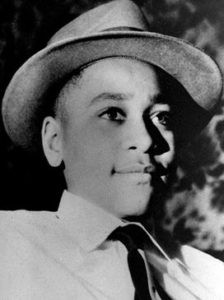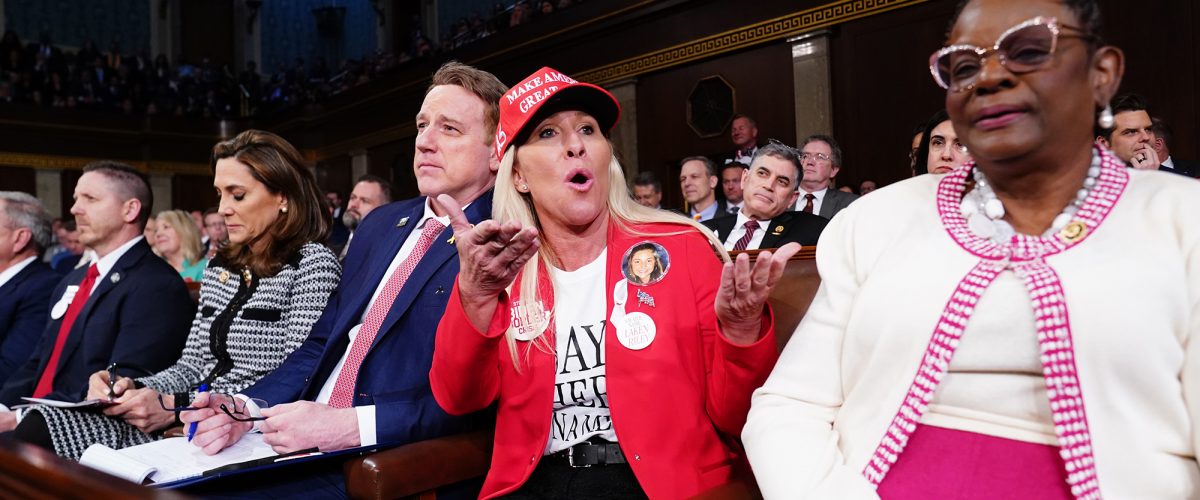The murder of 22-year-old nursing student Laken Riley on the campus of the University of Georgia Feb. 22 has drawn national media interest and political activity. Right-wing movers and shakers have especially been galvanized by this one murder.
I think I know why: There’s a toxic trope in the conservative DNA that can travel through time and inflict damage on every generation in different disguises. The trope: The dangerous, virile, sexual racial other.

Reps. Marjorie Taylor Greene, R-Ga., and Pat Fallon, R-Texas, attend President Joe Biden’s State of the Union address in the House Chamber of the U.S. Capitol on Thursday, March 7, 2024. (Tom Williams/CQ Roll Call via AP Images)
The toxic trope often lies dormant for decades until a demagogue needs to stoke fear. Then the trope comes to life again. Once awakened, it has the unique ability to time travel, taking new forms and resulting in new fears while retaining all its toxic qualities.
That’s what happened last week at the State of the Union address, when Georgia Rep. Marjorie Taylor Greene attempted to bait President Joe Biden to “say her name” as if to imply all immigrants are rapists and murderers and criminals — something Donald Trump actually says out loud.
This is the latest rendition of the ancient trope of the racial other as a violent criminal who rapes white women. The trope lives in a boiling, running-over-the-edges pot of deep emotions. Rational deliberation, intelligent conversation, even facts and evidence drown in this cauldron of rage. The virile, violent male as racial other dominates the history of white people. The trope lies in the nasty basement of the evangelical mind, wrapped in radioactive protective material and labeled: “Use in case of emergency.”
“The trope lies in the nasty basement of the evangelical mind, wrapped in radioactive protective material and labeled: ‘Use in case of emergency.’”
There’s a deep irony here. Conservatives like to argue there is no racism in America. This begs the question: If there is no racism in America, why do so many white Americans embrace the most obvious racist trope in the world?
A brief review of the history of the trope
The trope extends back into the fog of earliest history. All human memory contains stories of marauders pillaging, raping and murdering with impunity and without restraint for no reason other than they had the power to do so.
Genesis 34 contains a graphic illustration of the ancient trope in practice. Dinah, the daughter of Jacob, is raped by Shechem. Her brothers avenge the outrage. Simeon and Levi, Dinah’s brothers, take their swords and come against the city unawares, killing all the males. They kill Hamor and his son Shechem with the sword and take Dinah out of Shechem’s house and go away. The act of unconditional revenge receives justification in the eyes of Jacob’s sons with a single question: “Should our sister be treated like a whore?”
In 19th-century America, Southern slave owners invested heavily in spreading the false trope of the powerful, strong, lusty Black male slave. According to the mythology, slaves plotted daily on how to escape, kidnap the master’s wife and daughters, murder the master and rape the women. No one bothered to ask if the story was true. Its constant repetition made it true among fearful Southern whites. No generation invested in perpetuating the toxic trope to the extent of Southern white males.

Emmett Till
The lynching era remains one of the most shameful episodes of American history. The long shelf life of the myth led to the lynching of a 14-year-old teenager, Emmett “Bo” Till in Mississippi. James Cone, in The Cross and the Lynching Tree, says, “Because he had whistled at a white woman and reportedly said “bye baby” as he departed from a store on Aug. 24, 1955, Emmett Till was picked up four days later around 2 a.m., beaten beyond recognition, shot in the head and thrown in the Tallahatchie River, “weighted down with a heavy gin fan.”
The white woman later admitted she concocted the story, but the fear of a Black male with a white woman was a trope too powerful to die.
As Cone queries, “How could (African Americans) live meaningful lives, knowing that they could be lynched for any small violation of what Richard Wright called “the ethics of living Jim Crow”?
The here and now
The toxic trope shows its ugly nature even now. Amid a rampage at Mother Emanuel African Methodist Episcopal Church in Charleston, S.C. — resulting in the murder of nine people — 21-year-old Dylann Storm Roof reportedly told churchgoers, “You rape our women, and you’re taking over our country, and you have to go.”
Behind the trope of Black rapists lies a fierce fear of Black autonomy, often expressed by white Southern leaders who unhesitatingly connected Black political and economic power to sexual liaison with whites. Sen. Benjamin Tillman on the Senate floor in 1900 articulated the toxic trope: “We will not submit to (the Black man) gratifying his lust on our wives and daughters without lynching him.”
“White supremacy has always had a perverse sexual tint.”
White supremacy has always had a perverse sexual tint.
Variations on the trope of the “Black Criminal Rapist” show up consistently in political campaigns to win white support. Nothing says white supremacy like this toxic trope.
George Bush awakened the beastly trope in his 1988 campaign against Gov. Michael Dukakis. In this drama, the racist toxic trope had a name: Willie Horton. He not only evoked the strong, violent male Other from the slavery era: he troped it, repurposing it to his own ends.

Bush campaign ad
A single ad, repeated across the country, depicted a Black man as an escaped murderer who raped a white woman. The ad, riddled with false claims, suggested Dukakis furloughed 268 murderers who escaped and raped white women. The key to the emotional power of the ad was a revolving prison door as Black criminals marched into the darkness to attack white women.
Kathleen Hall Jamieson in Dirty Politics: Deception, Distraction, and Democracy concludes: “William Horton and Michael Dukakis are now twinned in our memory. The fact that our memories are factually inaccurate does not diminish their power. Dukakis did not pardon Horton nor did the furloughed convict kill.”
Toxic metaphors are parasites on the brain.
“During the Trump administration, the toxic trope made a new appearance.”
During the Trump administration, the toxic trope made a new appearance. Jose Inez Garcia Zarate, who was in the United States illegally, shot Kate Steinle in the back in San Francisco on July 1, 2015. The bullet ricocheted off the concrete deck of the pier before hitting Steinle, and Zarate claimed the shooting was an accident. On Nov. 30, 2017, a jury acquitted Zarate of murder and manslaughter charges but convicted him of being a felon in possession of a firearm. The fact of Zarate’s acquittal on murder charges didn’t deter conservatives who only continued to push the narrative.
The “Trump card” was the toxic trope of the rapist murderer. The incessant strumming of Trump’s one-string guitar has become so discomfiting, psychiatrist John Gartner says, “Biden’s brain is aging; Trump’s brain is dementing.”
Marjorie Taylor Greene brings the toxic trope to the State of the Union
Last week, the latest reincarnation of the toxic trope showed its ugly face at the State of the Union address. Rep. Marjorie Taylor Greene, R.-Ga., came out swinging decked in MAGA gear and pushing the tragic story of Laken Riley, killed by an illegal immigrant. As Biden entered the hall, she handed him a Laken Riley pin. She tried to have a direct conversation with Biden, telling him to “say her name.”

Laken Riley
The story is tragic, yes, but it is not representative of all immigrants or even most immigrants.
Writing for AZ Central, columnist E.J. Montini explains it well:
You may not want to admit it, but you know why the murder of 16-year-old Arizona high-school student Preston Lord is not a national story, as is the murder in Georgia of 22-year-old nursing student Laken Riley.
It is not because of who the victim was. No. It is because of who is accused of the killing.
The seven young men arrested in connection with Lord’s death are from the suburbs. They grew up in American neighborhoods, going to American schools in communities that pride themselves with extolling American values.
The man accused of murdering Riley is an undocumented Venezuelan migrant.
Rep. Greene’s interaction with Biden was a political statement more than genuine concern for murder victims. This one story fit the trope she wanted to employ. She never has asked the president to say the names of women killed by white men in Georgia.
And the entire MAGA band of conservatives have been happy to raise the toxic trope in the air like a piece of dirty white linen with her. The day after Riley’s death, Georgia Gov. Brian Kemp said: “It is an understatement to say that this is a major crisis. Because of the White House’s failures, every state is now a border state. Laken Riley’s murder is just the latest proof of that.”
Were all the murders that happened the day before this one not a national crisis? Why does this one awful murder constitute a crisis when thousands of other murders have not? It’s not because of the victim; it’s because of the accused perpetrator.
Not content to resurrect Jim Crow, today’s MAGA faithful serve up the old notion that racialized others are not fit to be breathing in the United States of America. They have made their worldview clear even as they disguise it as the “Christian worldview.” Their “worldview” is white supremacy, “in all its succulent and sanctimonious power,” as Ta Nehisi Coates puts it.
Now is the time for new tropes
Responding to the toxic trope of immigrants as “rapists and murderers” can be frustrating. A rhetorical scholar or a public speech teacher can show how the use of hasty generalizations and single incidents exemplify poor arguments. A freshman debater knows a single example can’t win a debate.
“A freshman debater knows a single example can’t win a debate.”
A simple review of the facts should be sufficient to put a stop to the toxic trope. For example, immigrants coming to the United States are more often vegetable and fruit pickers, roofers, bricklayers and day laborers. Google “typical jobs for immigrants” and you will find mariachi band player, not murderer.
The reality is most immigrants from Mexico are women. Women from Central and South America came to the United States to fill vacant domestic jobs. Yet the anti-immigrant rhetoric maintained our country needed protection from the mythological hyper-masculinized image of the Latino criminal immigrant — the “rapists and thugs” of Trump’s imagination.
John Fea, in Believe Me says: “The odds that an American will be killed by an illegal immigrant are one in 10.9 million per year. One is more likely to die from walking across a railroad track or having one’s clothes spontaneously catch fire.”
Yes, Laken Riley’s murder is awful. But so is every other murder that happens — 99.99% of which are not perpetrated by immigrants.
Somehow, we must learn to communicate the destructive nature of the toxic trope of the criminal Other. Racism and xenophobia harm white people as badly as they harm Black and brown people. Ours is the joyful task of convincing people there is more than enough for everyone rather than the fearful sermons of the right-wing of scarcity and not enough.
The old tropes have hurt everyone by undermining government safety-net programs and weakening public education, health care and environmental protections for all.
I challenge the old toxic trope. We can do better. A new song is on our tongues waiting to explode. Show people how immigration has proved to be a win-win for everyone as a means of repopulating and revitalizing small towns across the country. As Heather McGee argues in The Sum of Us, it would be better for everyone if society is not exploited by wealthy interests sowing the seeds of racial division for profit.
We are undergoing a dramatic demographic shift as “a nation with no racial majority” comes into existence. Fighting against this new reality with demagogic fears and toxic tropes is a defeatist approach. Now, we need to develop a spirit of investing in our culture “broadly and without prejudice,” McGee says.
“Bad tropes have to be fought with better tropes.”
Finally, I am convinced the best way to eradicate the toxic trope is with better tropes. Bad tropes have to be fought with better tropes. But they also must be fought with powerful passions, deep faith and ego integrity to face down a MAGA conservative juggernaut insisting that liberals are not true believers.
New meaning can only occur as part of a struggle with previous meaning.
True tropes become our best defense against the negative, destructive and toxic trope — a defense against the lies, misinformation and myths of an ancient past. To trope, in my view, is to fight the influence of the one-string guitar playing the toxic trope with a full orchestra dedicated to diversity, inclusion, openness, compassion and empathy.
Progress now depends upon the creative intelligence of a progressive class capable of producing new memes, new words, new meanings and new metaphors for a civilization at the beginning of a new age, not a civilization dying.

Rodney Kennedy
Rodney W. Kennedy is a pastor and writer in New York state. He is the author of 10 books, including his latest, Good and Evil in the Garden of Democracy.


